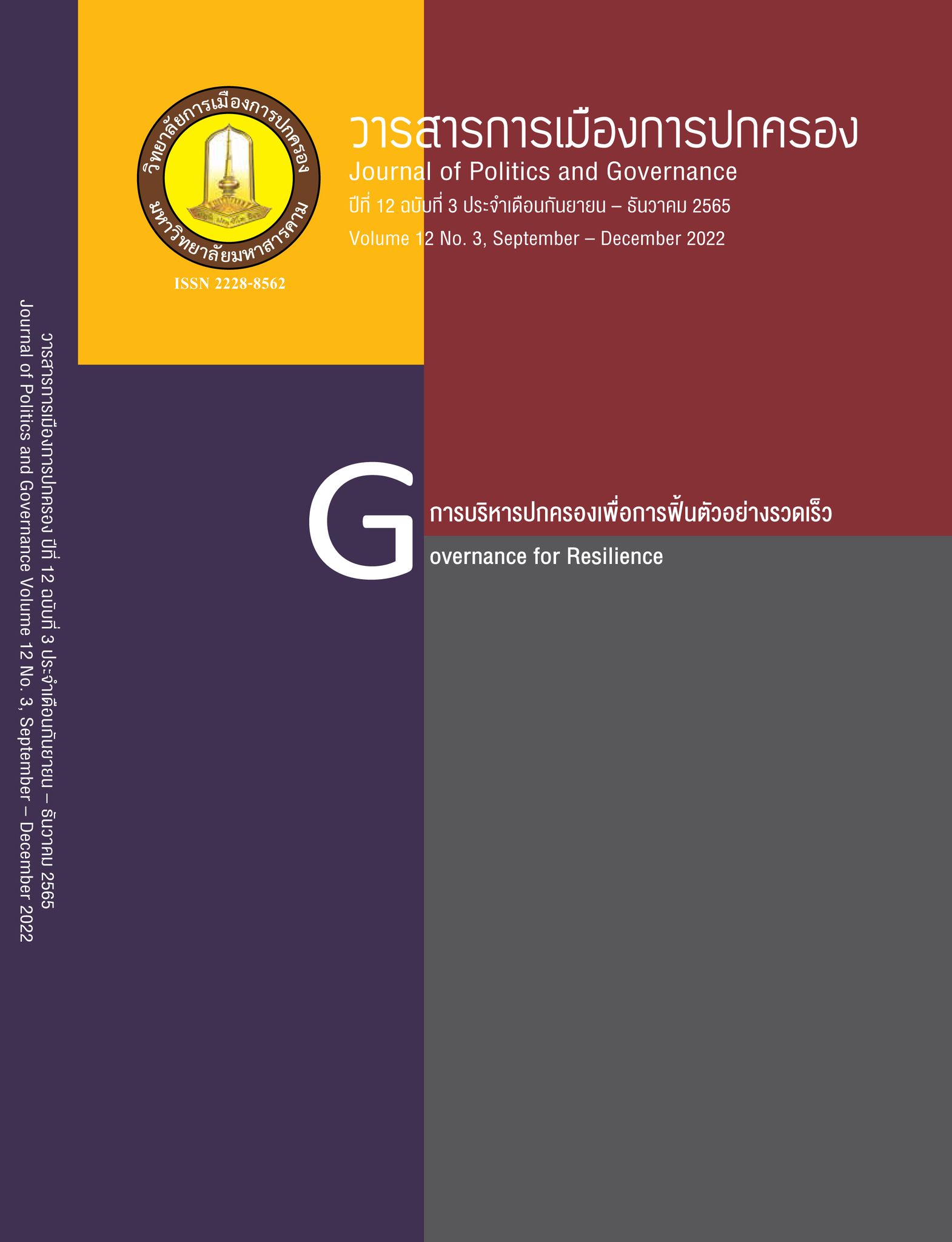School-Based Management for Local Development: An analytical study on Co-production concept
Main Article Content
Abstract
This research aimed to study the concept of co-production in Thai basic education administration by the Local Administration Organization under the National Education Act B.E. 2542 (1999). Documentary research was employed mainly by analyzing the assessment guidelines for School-Based Management for Local Development (SBMLD) published by the Department of Local Administration, Ministry of Interior. The study revealed that the provisions of basic education services under the SBMLD assessment guidelines were congruent with the concept of co-production under the New Public Governance paradigm. According to the guidelines, school boards must operate by collaborating with all sectors in different roles, including co-initiator, co-design, co-delivery, and co-assessment. However, these collaboration processes emphasized only formal collaboration, while both informal engagements with relevant stakeholders and active citizenship characteristics still deserve more attention.
Article Details
References
กรมส่งเสริมการปกครองท้องถิ่น. (2558). คู่มือประเมินการบริหารโดยใช้โรงเรียนเป็นฐานในการพัฒนาท้องถิ่น (School-Based Management for Local Development - SBMLD). สืบค้นจาก https://sbmldinnovation.com/media/document/01.pdf
กรมส่งเสริมการปกครองท้องถิ่น. (2563). แผนพัฒนาการศึกษาท้องถิ่น (พ.ศ. 2561-2565). สืบค้นจาก http://www.dla.go.th/upload/ebook/column/2020/10/2298_6153.pdf
นันธิดา จันทร์ศิริ. (2558). การจัดการเครือข่ายในกระบวนการนโยบายสาธารณะ. สารอาศรมวัฒนธรรมวลัยลักษณ์, 15(1), 145-153.
ปกรณ์ ศิริประกอบ. (2560) 3 พาราไดม์ทางรัฐประศาสนศาสตร์: แนวคิด ทฤษฎีและการนำไปปฏิบัติจริง (พิมพ์ครั้งที่ 3). กรุงเทพฯ: โรงพิมพ์แห่งจุฬาลงกรณ์มหาวิทยาลัย.
ประเวศ วะสี. (2563). วุฒิสภา-ภาคีเครือข่ายฯ จัดเวทีเสวนาเรื่อง “พลเมืองกัมมันตะกับตำบลเข้มแข็ง” ‘นพ.ประเวศ’ แนะสร้างพลเมืองที่ตื่นรู้เป็นวาระแห่งชาติแก้ปัญหาการเมือง-เศรษฐกิจ. สืบค้นจาก https://www.thaipost.net/main/detail/75033
วุฒิชัย มูลศิลป์. (2554). สมเด็จพระปิยมหาราชกับการปฏิรูปการศึกษา (พิมพ์ครั้งที่ 4 ฉบับปรับปรุงใหม่). กรุงเทพ: สมาคมผู้จัดพิมพ์และผู้จัดจำหน่ายหนังสือแห่งประเทศไทย.
สำนักงานเลขาธิการสภาการศึกษา. (2560). รายงานการวิจัยการศึกษาแนวทางการพัฒนากฎหมายการศึกษาเพื่อการบริหารจัดการศึกษาในเขตพัฒนาเศรษฐกิจพิเศษ. กรุงเทพฯ: บริษัท.เอส.ซี.พริ้นท์แอนแพค จำกัด.
เสาวนิตย์ ชัยมุสิก. (2544). การบริหารโดยใช้โรงเรียนเป็นฐานเพื่อการประกันคุณภาพการศึกษา. กรุงเทพฯ: บุ๊คพอยท์.
อรุณี สัณฐิติวณิชย์. (2557). การร่วมกันจัดบริการสาธารณะระดับท้องถิ่นของพลเมือง: กรณีศึกษาการจัดการขยะของชุมชนชลประทาน จังหวัดอุบลราชธานี. วารสารวิชาการ Veridian E-Journal ฉบับมนุษยศาสตร์ สังคมศาสตร์ และศิลปะ, 7(1), 625-635.
อัมพร ธำรงลักษณ์. (2556). การบริหารปกครองสาธารณะ (Public governance) การบริหารรัฐกิจในศตวรรษที่ 21 (พิมพ์ครั้งที่ 2). กรุงเทพโครงการตำรา คณะรัฐศาสตร์ มหาวิทยาลัยธรรมศาสตร์.
อุทัย บุญประเสริฐ. (2543). การศึกษาแนวทางการบริหารและการจัดการศึกษาของ สถานศึกษาในรูปแบบการบริหารโดยใช้โรงเรียนเป็นฐาน (School-Based management). กรุงเทพฯ: คุรุสภาลาดพร้าว.
Center for American Progress. (2015). Report of the Commission on Inclusive Prosperity. Retrieved from https://cdn.americanprogress.org/wp-content/uploads/2015/01/IPC-PDF-full.pdf
Bovaird, T. (2007), Beyond Engagement and Participation: User and Community Coproduction of Public Services. Public Administration Review, 67, 846-860. https://doi.org/10.1111/j.1540-6210.2007.00773.x
Bovaird, T., Loeffler, E. (2012). Engagement to Co-production: The Contribution of Users and Communities to Outcomes and Public Value. Voluntas 23, 1119–1138. https://doi.org/10.1007/s11266-012-9309-6
Brudney, J., & England, R. (1983).Toward a Definition of the Coproduction Concept. Public Administration Review, 43(1), 59-65. doi:10.2307/975300
David T. G. (2006). Decentralisation And School-Based Management in Thailand. International Review of Education, 50(3), 151-167. doi: 10.1007/978-1-4020-3358-2_8
Maddalena S., Mariafrancesca S. & Michael H. (2018). Understanding co-production as a new public governance tool, Policy and Society, 37(3), 277-293. doi: 10.1080/14494035.2018.1521676
Myers, D. and Stonehill, R. (1993). School-Based Management. Retrieved from https://files.eric.ed.gov/fulltext/ED353688.pdf
Osborne, S.P. (2006). The New Public Governance?, 8(3), 377-387. doi: 10.1080/14719030600853022
Osborne, S.P. (2010). Introduction: The (New) Public Governance: A Suitable Case for Treatment ?. In The New Public Governance ?: Emerging Perspectives on the Theory and Practice of Public Governance. Stephen P. Osborne (ed.). London: Routledge.
Ostrom, E. (1978). Citizen participation and policing: What do we know. Nonprofit and Voluntary Sector Quarterly, 7(1), 102-108.
Ostrom, E., (1996). Crossing the great divide: Coproduction, synergy, and development, World Development, Elsevier, 24(6), 1073-1087. doi: 10.1016/0305-750X(96)00023-X
Parks, R.B., Baker, P.C., Kiser, L., Oakerson, R., Ostrom, E., Ostrom, V., Percy, S.L., Vandivort, M.B., Whitaker, G.P. and Wilson, R. (1981). CONSUMERS AS COPRODUCERS OF PUBLIC SERVICES: SOME ECONOMIC AND INSTITUTIONAL CONSIDERATIONS. Policy Studies Journal, 9,1001-1011. https://doi.org/10.1111/j.1541-0072.1981.tb01208.x
Percy, Stephen L.; Kiser, Larry L.; Parks, Roger B. (1980). Citizen Coproduction: A Neglected Dimension of Public service delivery. Retrieved from https://dlc.dlib.indiana.edu/dlc/bitstream/handle/10535/3675/spercy01.pdf?sequence=1&isAllowed=y
Pestoff, V. (2011). Co-production and Third Sector Social Services in Europe: Some Concepts and Evidence. Voluntas: International Journal of Voluntary and Nonprofit Organizations, 23(4), 1102-1118. Retrieved from http://www.jstor.org/stable/41683096
Sharp, E. B. (1980). Toward a New Understanding of Urban Services and Citizen Participation: The Coproduction Concept. Midwest Review of Public Administration, 14(2), 105–118. Doi: 10.1177/027507408001400203
Strokosch, K., and Osborne, S.P. (2020). Co-experience, co-production and co-governance: an ecosystem approach to the analysis of value creation, Policy & Politics, xx(xx), 1–18, DOI: 10.1332/030557320X15857337955214
Strokosch K., Osborne S.P. (2021). Co-production from a Public Service Logic Perspective. In: Loeffler E., Bovaird T. (eds) The Palgrave Handbook of Co-Production of Public Services and Outcomes. Palgrave Macmillan, Cham. https://doi.org/10.1007/978-3-030-53705-0_6
W. H. Voorberg, V. J. J. M. Bekkers & L. G. Tummers. (2015). A Systematic Review of Co-Creation and Co-Production: Embarking on the social innovation journey, Public Management Review, 17(9), 1333-1357, doi: 10.1080/14719037.2014.930505
Whitaker, G. (1980). Coproduction: Citizen Participation in Service Delivery. Public Administration Review, 40(3), 240-246. doi:10.2307/975377


